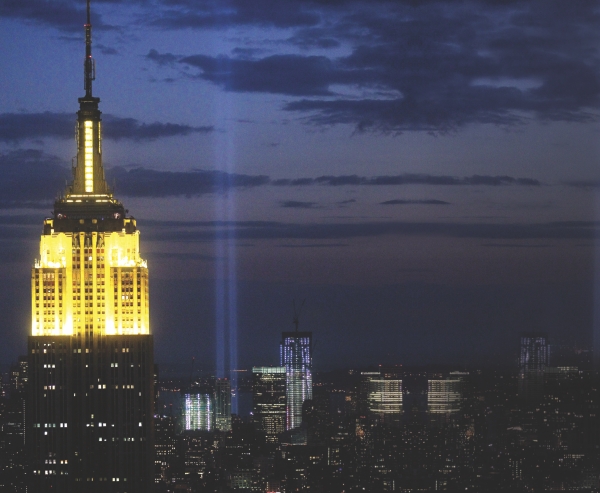
Photo: AFP
10 PAST 9/11
By Sifana Sohail
“We keep repeating that Islam has been hijacked” My Faith My Voice, Native Deen
These were the words of many other Muslims who have suffered the effects of the Twin Tower disaster on September 11, 2001. Twice traumatised by 9/11, once as victims of a terrorist attack and again as victims of racial discrimination, Muslims in general have been hit hard by the shockwaves that 9/11 produced. Hard to imagine, but before 9/11, Muslims were the most accepted minority in the US. Of course this all rapidly changed after American Airlines Flight 11 crashed into the Twin Towers.
Many Muslims haven't been the target of racism; luckily they don't have any personal experiences to share. Other Sikhs, South Asians, Arabs and Middle-eastern Christians have suffered simply because people perceive them as looking 'Muslim'; “guilt by association”. It varies from place to place, person to person. Just a few days after 9/11, one waiter who worked in Wardolf-Astoria in New York had his nametag switched by his manager so that the guests wouldn't 'freak out' at his 'Muslim name', Mohammed. To the contrary, when he explained the situation to the guests, they behaved cordially and even apologised. That was 10 years ago. Just this year Rena* was filling up on petrol at a petrol station in downtown Phoenix when a man drove by with the window open and yelled obscene words at her, threatening her. Terrified, she rushed home as fast as possible.
Sarai* was young when 9/11 happened. Even now she remembers seeing the crash and the devastation afterwards; most of her other memories from that age have faded into time. “We were at the other end of the country. I remember thinking repeatedly that I could feel the effect of the crash, even from the there. I was just 6 at the time.” She doesn't remember much about how she was treated before 9/11, but she vividly remembers the treatment afterwards. “There's a lot that I didn't understand then; I used to be an extremely naive kid. There was this one time when we were on the bus (all Muslim kids from my Islamic school) and we were going through a rough neighbourhood. I was admiring the huge snowman on someone's front yard when a handful of rocks just came at the bus. They didn't get inside, but I was obviously very scared. I never understood that incident, not then.”
One of her friends, Bahira*, says, “I had stuff thrown at me and they called me a terrorist, and since I was younger, and didn't have, well, a backbone, I didn't know how to cope with it; I was mortified.” Similar stories can be found all over the internet. Even some South Asian Christians were told to “go back to their country.” The Qur'an has been slandered, burnt and Muslims have been forced to witness their religion being torn to pieces by Islamphobes that 'have read the Qur'an' and hence possess exclusive knowledge about the violence that it encourages. Influential people have come forward to discredit and accuse the Qur'an of “crimes against humanity”. “I think it just revived radicalism unseen since World War II. It marked the time to stereotype all Muslims...” says Lisa*. The mainstream media seems focused on a negative portrayal of Muslims. “It put a bad perspective on Muslims in general. All because of the incident everyone believes that all Muslims are terrorists when of course, we're not. Islam is based around peace but ever since 9/11 everyone seems to be ignorant about that.” Dissatisfied and upset by the racism and lack of due attention, The Sikh Coalition has founded a website titled 'Unheard Voices of 9/11” to allow the 'twice-victims' their stories.
Of course, many communities and individuals have banded together. Steve Stone, a pastor in Tennessee, set up a sign in front of his church welcoming the new Islamic Centre into the neighbourhood last year. While hesitant at first, his church members slowly became accustomed to the Muslims, to the extent where they offered their church for prayers during Ramadan while the Centre was still under construction. “It helps, when they know Muslims personally,” Hamza* comments. “Otherwise, all they see are pictures of men in beards and turbans plotting and then things crashing and burning. If they know a Muslim personally, the difference is tremendous. We seem like normal people to them, and they treat us accordingly.”
A decade later however, although pointed fingers persist, more Muslims seem to be happy with life. Surveys show that a majority of Muslims are content in America. The scars have not healed completely and while people out there still misunderstand and misquote Islam, “It's getting easier,” seems to be the general optimistic reply.
Going out on the 10th anniversary, “it could be dangerous,” cautions Lexi*, “The footage from that day is being replayed over and over again, bringing back the emotions from that day.” A rebellious, positive Dani* retorts, “Someone could very easily feel the same way any other day. We aren't scared to go out of the house any other day, why be worried about it today?”
*Names have been changed to protect privacy. All interviewed are currently residing in the United States of America.
